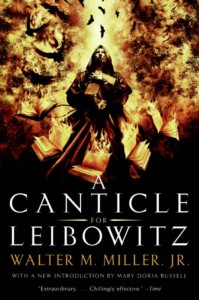 There’s a gripping scene near the end of one of my favorite books, Canticle for Leibowitz, where a priest tries to convince a mother not to kill herself and her daughter after they have received a probably lethal dose of radiation during an atomic war. The government has set up euthanasia festivals–looking for all the world like state fairs–where parents and their children can go to ride a carousel or a Ferris wheel before going to the final tent to end their lives. He begs and cajoles her not to go, but in the end is left to watch, powerless, as she takes her little girl’s hand and leads her toward the colorful tents, the delicious food, and the end of their lives.
There’s a gripping scene near the end of one of my favorite books, Canticle for Leibowitz, where a priest tries to convince a mother not to kill herself and her daughter after they have received a probably lethal dose of radiation during an atomic war. The government has set up euthanasia festivals–looking for all the world like state fairs–where parents and their children can go to ride a carousel or a Ferris wheel before going to the final tent to end their lives. He begs and cajoles her not to go, but in the end is left to watch, powerless, as she takes her little girl’s hand and leads her toward the colorful tents, the delicious food, and the end of their lives.
Walter M. Miller, Jr (the author of Canticle), you will not be surprised to find out, was a Catholic. I am not a Catholic, but I have a deep love and admiration for the moral and intellectual courage of that tradition, and nowhere is that courage and sensitivity in starker display than in Catholic teachings about suffering and death. The Catholics understand, as so few in our modern age do, that suffering itself is not the measure of a life. They realize that, no matter how deceptively noble and sympathetic the arguments for euthanasia may be, in the end condoning suicide is indistinguishable from embracing shallow hedonism.
A heartbreaking news story brought this back to the forefront of my mind on Monday. Two brothers, aged 45, were killed by Belgian doctors at their request after finding out that they would go blind. The identical twins were born deaf, and they were unable to face the pain of never being able to see each other again. I have absolutely no condemnation for their decision, tragic as it might be, but I am deeply disappointed at the behavior of the doctors who ended their lives.
